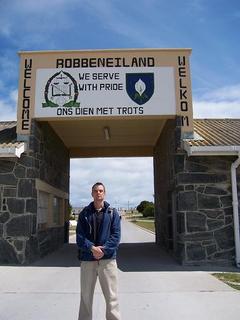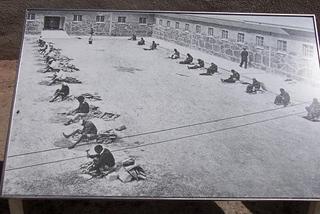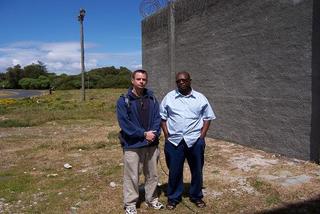Robben Island - the Birth of Freedom
As i arrived on Robben Island i realized that this place deserves the same somber respect as when i visited the German concentration camp of Dachau a few years ago. The difference is that here the outcome was much more positive. That is not to say that the apartheid regime was any less threatening. The men imprisoned on Robben Island were not criminals, but political prisoners - men who had ideas about how to create a better South Africa, a country that was free and its citizens equal.
 The first half of the tour consisted of a bus ride around the island with a very informative guide. There are actually several game animals on the island, some of which are endangered species finding sanctuary there. After the bus tour, we began the "real tour" of the prison itself. Our guide was Pheneas Poho, who was convicted in 1985 of treason and "subversive action" for organizing marches and leading protests against apartheid. He was sentenced to 15 years in prison.
The first half of the tour consisted of a bus ride around the island with a very informative guide. There are actually several game animals on the island, some of which are endangered species finding sanctuary there. After the bus tour, we began the "real tour" of the prison itself. Our guide was Pheneas Poho, who was convicted in 1985 of treason and "subversive action" for organizing marches and leading protests against apartheid. He was sentenced to 15 years in prison. Pheneas described prison life and how blacks were treated even worse than other prisoners. For example, blacks were served a fraction of the already measly meals that Indian and Colored (black/white mix) prisoners received. The purpose of this was to divide the prisoners and incite fighting. However, rather than fight over their food, the more 'privileged' prisoners chose to share their food with the others.
Pheneas described prison life and how blacks were treated even worse than other prisoners. For example, blacks were served a fraction of the already measly meals that Indian and Colored (black/white mix) prisoners received. The purpose of this was to divide the prisoners and incite fighting. However, rather than fight over their food, the more 'privileged' prisoners chose to share their food with the others.The prisoners of Robben Island came from different races, political affiliations (including communism), and competing ideas about toppling apartheid (primarily violence vs. non-violence). But in prison they put their differences aside and focused on working together. In order to improve their terrible living conditions, the prisoners would all have to agree on a proposed action before it was done. This is where democracy in South Africa was born.
The most remarkable thing about the men imprisoned on Robben Island is how they educated one another. Often while crushing limestone all day in the blazing sun a prisoner would whisper a lesson or write in the sand to teach the others what he knew. They also would smuggle books to each other and hide notes in the soil of the garden. As international pressure mounted and conditions began to improve, the men were allowed to exercise. They took this opportunity to play games to develop teamwork and encourage cooperation. Later these same men would become the future leaders and political representatives of the new nation.
I asked Pheneas about Mandela's leadership and the incredible will that the men had to work together. They realized that only through cooperation and unity could they eventually win their freedom and walk on the streets as equal citizens. I find this story incredibly powerful, suggesting that that peace is possible even in the most dire of conditions. I also realized that South Africa might not be a successful democracy today, if democracy had not first been born inside the prison walls of Robben Island.




1 Comments:
This trip ROCKS...
Post a Comment
<< Home